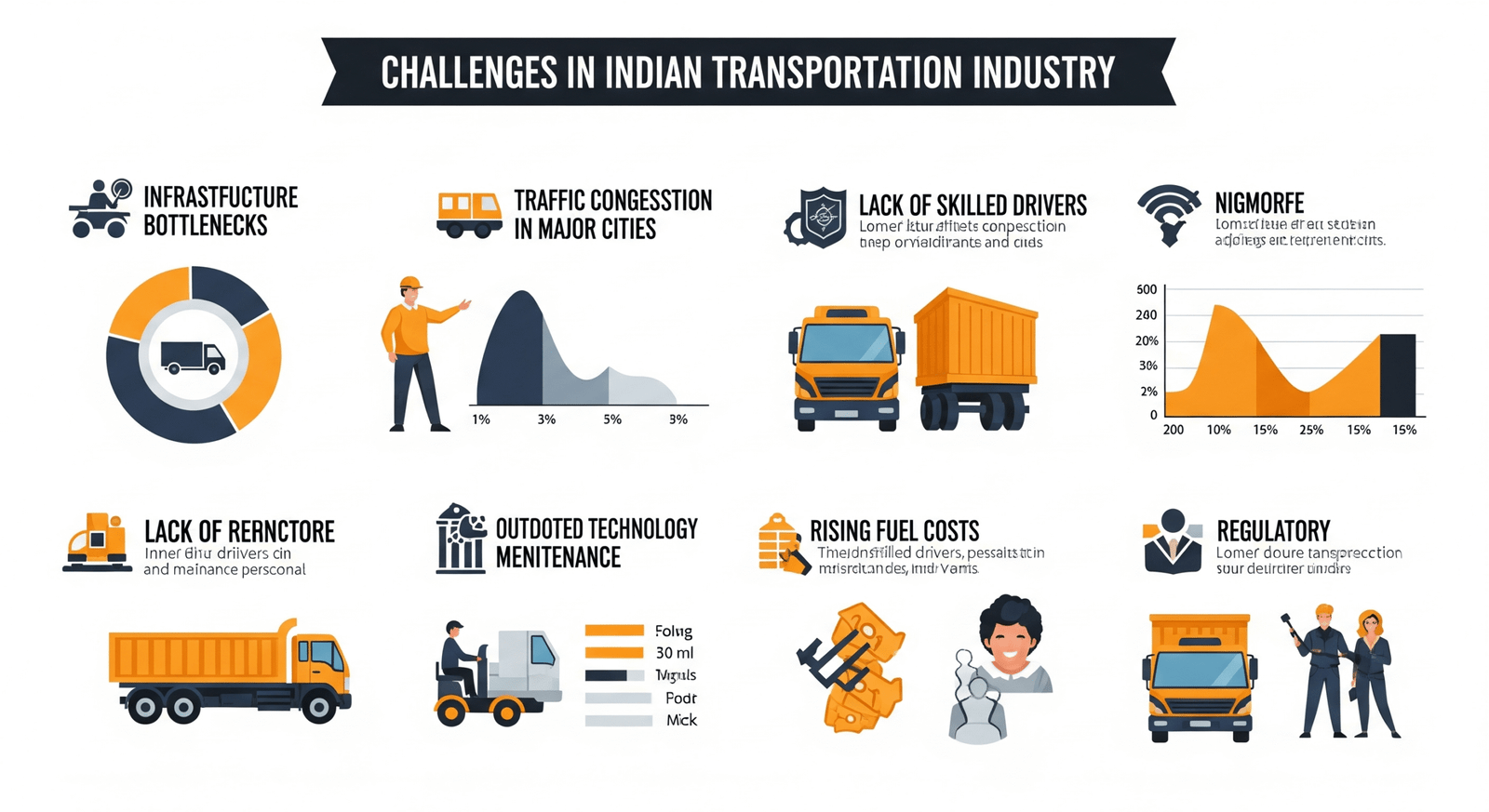India’s transportation industry is the backbone of its economy, responsible for moving billions of tonnes of goods annually across vast geographical terrains. However, shippers in India often face multiple challenges that can disrupt supply chains, inflate costs, and affect delivery timelines. Understanding these obstacles and adopting strategic solutions is essential for smooth operations.
1. Poor Infrastructure
Challenge:
Despite significant improvements, many highways, rural roads, and intermodal facilities still suffer from poor maintenance, congestion, and bottlenecks.
Solutions:
- Route Optimization: Use GPS-enabled route planning tools to avoid poorly maintained routes and minimize travel time.
- Collaborate with 3PLs: Partner with experienced third-party logistics providers who have better knowledge of alternate routes and access to multimodal transport networks.
2. Lack of Digitization
Challenge:
Many transport operations still rely on paper documentation and manual processes, leading to inefficiencies and data errors.
Solutions:
- Adopt TMS (Transport Management Systems): Integrate digital platforms to manage bookings, documentation, tracking, and analytics.
- Use eWay Bill System Smartly: Automate eWay bill generation to avoid delays and ensure compliance.
3. Unpredictable Delivery Timelines
Challenge:
Due to traffic congestion, route blockages, or local events, on-time delivery is often a hit or miss.
Solutions:
- Real-Time Tracking: Implement IoT and telematics solutions to get live updates on shipment status.
- Buffer Planning: Include reasonable buffer times in planning, especially during peak seasons or adverse weather forecasts.
4. Driver Shortage and Training Gaps
Challenge:
There is a growing scarcity of trained and reliable drivers, coupled with poor working conditions.
Solutions:
- Incentive Programs: Work with transporters that offer driver retention and incentive programs.
- Onboarding Checks: Conduct proper verification and training sessions for hired transport partners to maintain service quality.
5. Regulatory and Compliance Issues
Challenge:
Complex state-wise permits, toll systems, and tax compliance (like GST and road taxes) can delay shipments.
Solutions:
- Work with Compliant Partners: Choose logistics partners with strong regulatory compliance frameworks.
- Stay Updated: Regularly monitor government transport portals and Ministry of Road Transport and Highways updates for changes in policies.
6. High Logistics Costs
Challenge:
Freight charges, fuel costs, tolls, and warehousing expenses contribute to high logistics costs in India.
Solutions:
- Consolidated Shipping: Opt for full truckload (FTL) where feasible instead of multiple partial loads.
- Contract Negotiation: Build long-term relationships with carriers for better pricing models.
7. Security and Cargo Theft
Challenge:
Cargo theft and pilferage remain concerns, especially in transit through unsecured areas.
Solutions:
- Install GPS and Geofencing: Track movements and get alerts on route deviations.
- Secure Packaging and Insurance: Use tamper-proof packaging and comprehensive insurance policies to reduce risk.
8. Lack of Visibility Across the Supply Chain
Challenge:
Shippers often struggle to get end-to-end visibility into their shipments, leading to poor customer communication.
Solutions:
- Supply Chain Visibility Tools: Adopt platforms that provide dashboards with real-time updates, milestones, and exceptions.
- Collaborative Portals: Use digital platforms to communicate with vendors, transporters, and customers seamlessly.
Final Thoughts
While the Indian transportation industry presents several challenges, the right mix of technology, partnerships, and strategic planning can help shippers navigate these hurdles. By embracing digital transformation and working with reliable partners, businesses can not only reduce costs but also improve delivery efficiency and customer satisfaction.

Leave a Reply